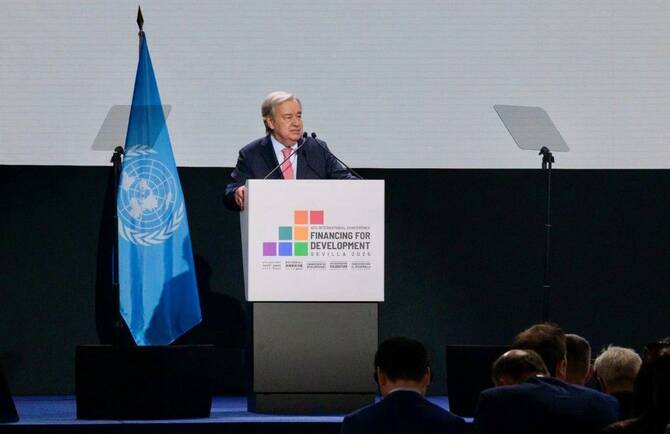
- ARAB NEWS
- 18 Aug 2025

NEW YORK CITY: UN Secretary-General Antonio Guterres on Thursday said he was “appalled” by the escalating humanitarian crisis in Gaza, condemned recent deadly strikes against displaced people, and warned that the enclave is on the brink of total collapse as fuel supplies run out.
He expressed grave concern over a series of attacks in recent days that hit locations in which Palestinians sought shelter or were trying to access food.
Guterres’ spokesperson, Stephane Dujarric, read a statement that said: “Multiple attacks (have) killed and injured scores of Palestinians. The secretary-general strongly condemns the loss of civilian life.”
Civilians in Gaza are running out of safe areas in which to shelter as Israeli evacuation orders continue to expand, Dujarric added as he warned of a dire humanitarian crisis amid mounting restrictions on the delivery of aid and rising casualties among relief workers.
Israeli authorities issued a new displacement order on Thursday targeting parts of Gaza City, citing as a reason rocket fire from Palestinian groups. It affected an estimated 40,000 people, including those living in a displacement site, a medical facility, and a neighborhood previously spared evacuation orders since a temporary ceasefire agreement between Israel and Hamas ended in March.
“As of earlier today, about 900 families are estimated to have fled,” Dujarric said, adding that approximately 78 percent of the Gaza Strip has now been affected by the cumulative effects of more than 50 such orders. When combined with the effects on areas designated as Israeli militarized zones, the figure rises to 85 percent, leaving just 15 percent of the territory available for civilians to live.
“Those areas are, of course, overcrowded,” Dujarric said. “They also severely lack basic services or proper infrastructure.”
He described the remaining habitable zones as fragmented and unsafe, and compared the humanitarian conditions there to having more than 2 million crammed into Manhattan but
“instead of buildings, the area is strewn with the rubble of demolished and burnt-out structures without any infrastructure or basic support.”
The UN Population Fund has reported that an estimated 700,000 women and girls in Gaza are experiencing “a nightmare” situation as a result of lack of access to menstrual hygiene products, water and privacy. It said it has nearly 170 truckloads of supplies ready for delivery but they remain blocked from entering Gaza.
Meanwhile, the UN’s Office for the Coordination of Humanitarian Affairs said that nine more aid workers from five organizations have died in Gaza since last Thursday, bringing the death toll among aid personnel to 107 in 2025, and 479 since the war began in October 2023; 326 members of UN staff are among the dead.
OCHA also highlighted the significant obstacles humanitarian operations faced in June. Out of nearly 400 attempts to coordinate with Israeli authorities, 44 percent were denied, and 10 percent were initially approved but later obstructed. Only a third of the missions were fully facilitated, while 12 percent were canceled due to logistical or security issues.
Four out of 16 humanitarian coordination efforts were denied on Thursday alone, Dujarric said, hindering efforts to relocate medical supplies and clear debris.
“The space left for civilians to stay is shrinking by the day,” he added.
In his statement, Guterres underscored the fact that international humanitarian law is “unambiguous” in its requirement for civilians to be protected and their basic needs met.
He warned that the continuing blockade on fuel deliveries, now entering an 18th week, threatens to bring remaining humanitarian operations to a halt.
“Without an urgent influx of fuel, incubators will shut down, ambulances will be unable to reach the injured and sick, and water cannot be purified,” he said, adding that the UN and its partners might soon be unable to deliver even the limited amount of aid that remains in Gaza.
Guterres repeated his call for “full, safe and sustained humanitarian access,” and said the UN has a ready, proven plan to deliver aid “safely and at scale” to civilians across the territory.
He also renewed his appeal for an “immediate, permanent ceasefire” and the “immediate and unconditional release of all hostages,” and stressed that all parties involved in the conflict must uphold their obligations under international law.